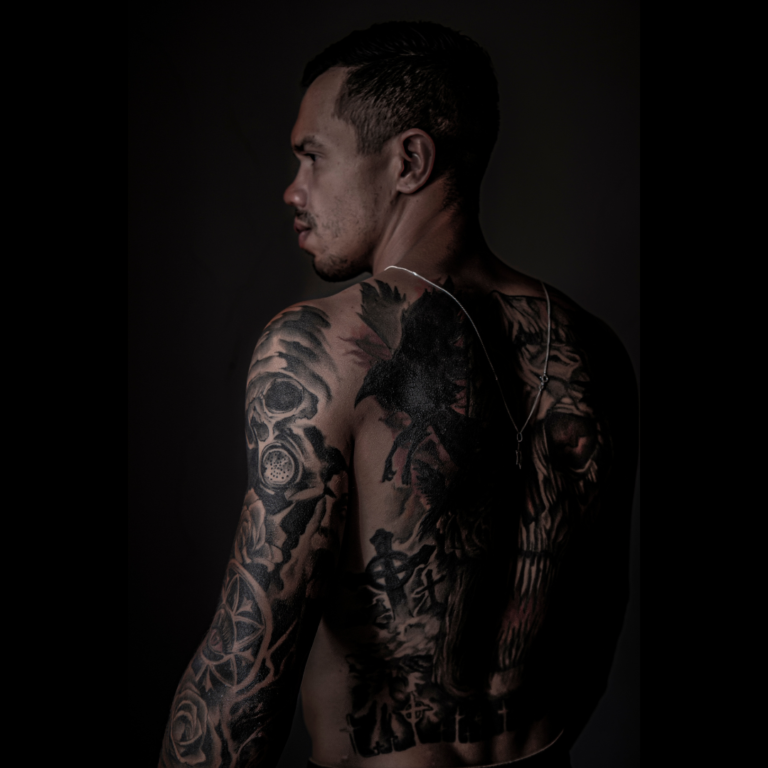Caring for your tattoo starts before you sit in the chair. Prepping mentally and physically for a tattoo is so important. We’ve created a comprehensive guide to tattoo covering everything you need to know to keep your tattoo in top condition.
Research is key when it comes to selecting the right tattoo artist. Check portfolios to ensure their style matches what you envision. Visit the studio beforehand, ensuring it’s clean and that you feel comfortable there. Don’t be afraid to ask about their hygiene practices—good artists welcome these questions.
In the days leading up to your appointment, make sure you’re drinking plenty of water. Hydrated skin tends to handle the tattooing process better, leading to a smoother session and faster healing.
A tattoo session can be physically demanding, depending on the size and placement of your tattoo. Make sure you’re well-rested so your body can handle the procedure more easily.
Make sure to eat a balanced meal before your appointment. Low blood sugar can cause light-headedness or fainting during the process. Foods rich in protein and carbohydrates are ideal to keep your energy levels stable throughout the session.
Wear clothing that allows easy access to the area where you’re getting tattooed. If you’re getting a larger piece, you might be seated for a few hours, so comfortable clothing is a must. For certain areas, it might be necessary to wear looser or darker clothing in case of ink stains.
Alcohol thins the blood, which can make you bleed more during the tattooing process. Additionally, it can affect your pain tolerance and impair judgment. Avoid drinking the night before or taking painkillers such as aspirin, which can also have blood-thinning effects.
In the days leading up to your appointment, moisturize the area to keep your skin healthy. However, on the day of your appointment, avoid putting any lotions, oils, or creams on the skin to prevent interference with the tattooing process.
Tattoos involve varying degrees of pain, depending on where you’re getting tattooed and your personal pain tolerance. Be prepared mentally for some discomfort. Breathing deeply and staying calm will help you handle the experience better.
Depending on the size of your tattoo, the process can take a while. Bring a book, listen to music, or download a movie to help pass the time and keep you relaxed.


Immediately after your tattoo is finished, your artist will apply a bandage or wrap. Keep this bandage on for 2-4 hours to protect the area from bacteria and debris. After removing the bandage, gently wash the tattoo with lukewarm water and a mild, fragrance-free soap. Pat the area dry with a clean towel or paper towel. Do not rub.
Wash your tattoo 2-3 times a day for the first two weeks, keeping it clean and free from dirt and oils that could cause infection. Always wash your hands before touching your tattoo.
Once the tattoo is dry after washing, apply a thin layer of fragrance-free, hypoallergenic lotion or a tattoo-specific ointment. Avoid using too much, as this can suffocate the skin and slow the healing process.
It’s vital to keep your new tattoo out of direct sunlight for at least two weeks. Sun exposure can cause fading and irritate the healing skin. After your tattoo has fully healed, always use sun cream on it to protect the colours.
It’s normal for your tattoo to start peeling around days 4-7 as part of the healing process. Don’t pick at the peeling skin or scabs, as this can lead to scarring or loss of colour.
Avoid submerging your tattoo in water (including pools, hot tubs, lakes, and baths) for at least 2-3 weeks. Submersion can introduce bacteria to the healing skin and may cause infection. Showering is fine as long as the tattoo isn’t soaked.
Signs of infection include excessive redness, swelling, pus, or an unusual odour. If you notice any of these symptoms, contact your tattoo artist or a healthcare professional for advice. Don’t try to treat it on your own.
The outer layer of skin usually heals in 2-3 weeks, but deeper layers can take up to 6 months to fully regenerate. During this time, continue moisturising your tattoo and protect it from sun exposure.
Avoid scratching, picking at scabs, tight clothing that might rub against the tattoo, and excessive sweating from intense workouts. Also, steer clear of harsh skin products like exfoliants and anything containing alcohol.
You can return to light activities a few days after getting your tattoo, but avoid strenuous exercise, especially if it involves a lot of sweating or contact with dirty surfaces.